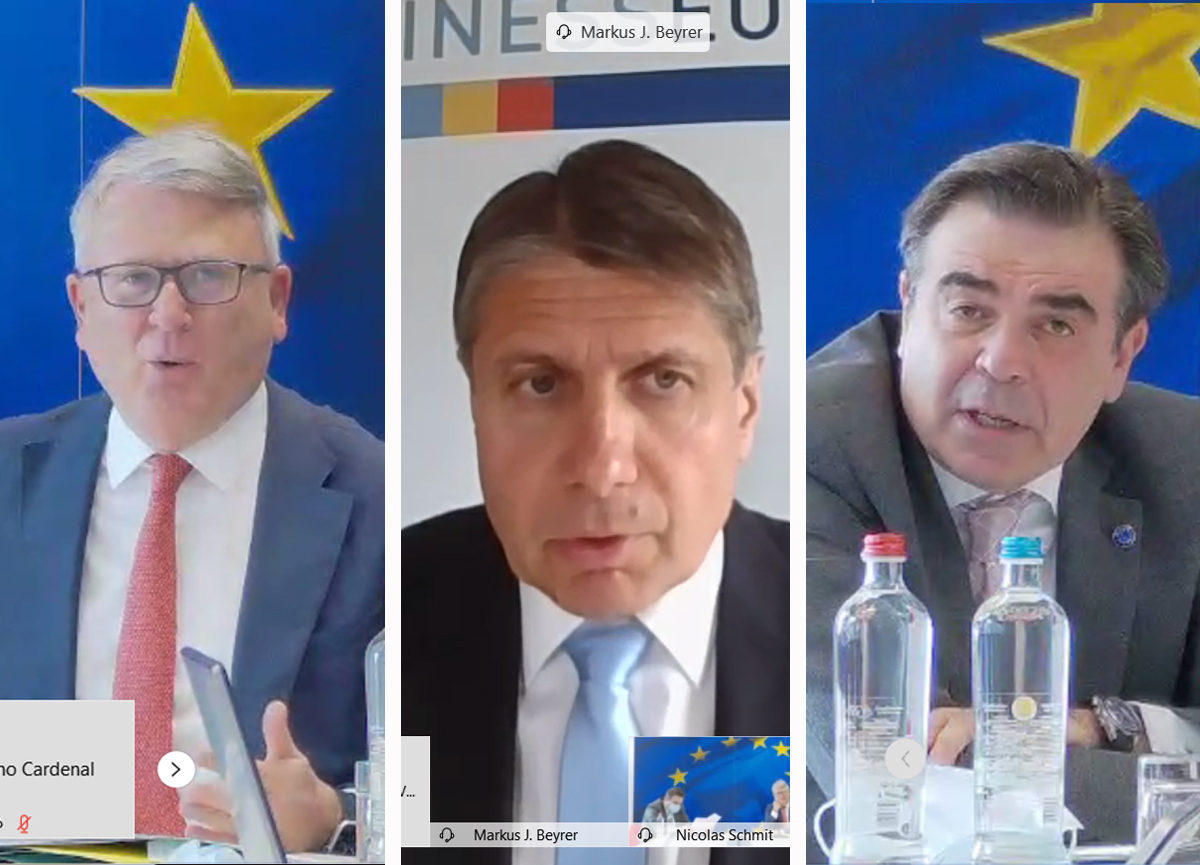BusinessEurope Headlines No. 2021-12
Boosting skills training provision across Europe: EU Commission should partner with business

Employers are main providers and, by and large, the main contributors to employee job-related trainings across Europe. The European Commission should partner with business to design a useful European policy initiative to improve skills training provision. The main purpose should be to strengthen the relevance of training provision to changing labour market needs. Before considering the shape of its upcoming initiative, the Commission should first map the landscape of training funds across Europe. Social partners are well placed to foster a diversified offer of training options for employees, and their autonomy needs to be respected. These were the key messages passed by BusinessEurope Director General Markus J. Beyrer in a meeting on 12 April with European Commission Vice-President for Promoting our European Way of Life, Margaritis Schinas, and European Commissioner for Jobs and Social Rights, Nicolas Schmit, on the Commission’s announced initiative on individual learning accounts.
Contact: Maxime Cerutti
Economic recovery depends on global cooperation
 During the plenary meeting of the Global Business Coalition on 14 April, BusinessEurope Director General Markus J. Beyrer referred to the importance of global cooperation and eliminating trade restrictions to support the economic recovery: “It is of critical importance to roll-back the trade restrictive measures that were introduced during this pandemic crisis. The World Trade Organisation (WTO) will have to play an important role, but business should engage actively and ensure that this time we are collectively more successful than we were during the 2008-2009 crisis”. The Global Business Coalition meeting was an opportunity to discuss key business priorities to support the economic recovery. “We need international cooperation and should monitor closely how governments will spend the recovery money. There are important stimulus packages in many countries and regions with certain conditions attached. We must ensure these conditions are in line with international obligations including in the WTO, for instance in the area of public procurement”, Beyrer said.
During the plenary meeting of the Global Business Coalition on 14 April, BusinessEurope Director General Markus J. Beyrer referred to the importance of global cooperation and eliminating trade restrictions to support the economic recovery: “It is of critical importance to roll-back the trade restrictive measures that were introduced during this pandemic crisis. The World Trade Organisation (WTO) will have to play an important role, but business should engage actively and ensure that this time we are collectively more successful than we were during the 2008-2009 crisis”. The Global Business Coalition meeting was an opportunity to discuss key business priorities to support the economic recovery. “We need international cooperation and should monitor closely how governments will spend the recovery money. There are important stimulus packages in many countries and regions with certain conditions attached. We must ensure these conditions are in line with international obligations including in the WTO, for instance in the area of public procurement”, Beyrer said.
Contact: Luisa Santos
Post-COVID economic growth: bank lending and deeper capital markets are essential
 The EU must work in partnership with the financial sector as the recovery develops and emergency support measures are gradually reduced, to maintain bank lending to companies, as well as to improve access to capital markets. This was the key message of BusinessEurope Director of Economics, James Watson, during an event organised by the Alternative Investment Management Association (AIMA) on 13 April. During the video conference under the theme “Europe’s Economic Recovery: How capital market investors can contribute to post-COVID economic growth”, James noted the urgent need to address structural weaknesses in EU capital markets through the implementation of the Capital Markets Union, as well as the importance of ensuring future regulations, such as the EU implementation of Basel III, support bank lending.
The EU must work in partnership with the financial sector as the recovery develops and emergency support measures are gradually reduced, to maintain bank lending to companies, as well as to improve access to capital markets. This was the key message of BusinessEurope Director of Economics, James Watson, during an event organised by the Alternative Investment Management Association (AIMA) on 13 April. During the video conference under the theme “Europe’s Economic Recovery: How capital market investors can contribute to post-COVID economic growth”, James noted the urgent need to address structural weaknesses in EU capital markets through the implementation of the Capital Markets Union, as well as the importance of ensuring future regulations, such as the EU implementation of Basel III, support bank lending.
Contact: James Watson
The EU-Andean trade deal has delivered for European companies
 On 8 April 2021, BusinessEurope submitted its contribution to the European Commission online public consultation on the evaluation of the EU-Colombia/Ecuador/Peru Trade Agreement. Overall, the impact of the agreement has been positive for the European business community. Trade between the EU and the region has grown since its implementation in 2013 and the EU also remains the leading foreign investor in the three Andean countries. While European products and services have become more competitive in the three countries in the region, the deal also facilitated foreign direct investment and improved the access to public procurement markets. Nonetheless, some irritants remain for European companies active in the region. For instance, cumbersome certification and labelling procedures, restricted access to public procurement procedures on sub-national level, as well as import bans on certain products and services. These issues need to be addressed to ensure the full implementation of the agreement and to maximise its potential for growth and prosperity.
On 8 April 2021, BusinessEurope submitted its contribution to the European Commission online public consultation on the evaluation of the EU-Colombia/Ecuador/Peru Trade Agreement. Overall, the impact of the agreement has been positive for the European business community. Trade between the EU and the region has grown since its implementation in 2013 and the EU also remains the leading foreign investor in the three Andean countries. While European products and services have become more competitive in the three countries in the region, the deal also facilitated foreign direct investment and improved the access to public procurement markets. Nonetheless, some irritants remain for European companies active in the region. For instance, cumbersome certification and labelling procedures, restricted access to public procurement procedures on sub-national level, as well as import bans on certain products and services. These issues need to be addressed to ensure the full implementation of the agreement and to maximise its potential for growth and prosperity.
![]() Contact: Benedikt Wiedenhofer
Contact: Benedikt Wiedenhofer
Image copyright: European Commission
An EU International Procurement Instrument should come in place urgently
 “Over the past years, developments in the global trading environment have made it clear to the European business community that we cannot wait longer for an effective instrument at EU level” reads a BusinessEurope statement on an EU International Procurement Instrument (IPI), published on 14 April 2021. BusinessEurope calls on all relevant parties to double their efforts to accelerate and conclude the legislative process as soon as possible. An EU IPI should be ambitious and effective. In this regard, BusinessEurope also outlines a number of key elements: (1) the IPI must remain an offensive instrument with a core objective to open-up third public procurement markets that remain closed for EU operators; (2) ensure that the implementation of the IPI takes place in a harmonised manner across the EU; (3) include strong anti-circumvention provisions and ensure that exemptions are shaped in a way that, when implemented, do not undermine the effectiveness of the IPI as a leverage instrument. BusinessEurope remains fully committed in this debate.
“Over the past years, developments in the global trading environment have made it clear to the European business community that we cannot wait longer for an effective instrument at EU level” reads a BusinessEurope statement on an EU International Procurement Instrument (IPI), published on 14 April 2021. BusinessEurope calls on all relevant parties to double their efforts to accelerate and conclude the legislative process as soon as possible. An EU IPI should be ambitious and effective. In this regard, BusinessEurope also outlines a number of key elements: (1) the IPI must remain an offensive instrument with a core objective to open-up third public procurement markets that remain closed for EU operators; (2) ensure that the implementation of the IPI takes place in a harmonised manner across the EU; (3) include strong anti-circumvention provisions and ensure that exemptions are shaped in a way that, when implemented, do not undermine the effectiveness of the IPI as a leverage instrument. BusinessEurope remains fully committed in this debate.
![]() Contact: Sofia Bournou
Contact: Sofia Bournou
Calendar 
- 20 April: Green taxation event
- 23 April: High-level EU-Africa green investment forum
- 28-29 April: Fueling productivity and business dynamism after COVID-19
- 30 April: Event on the EU-Mercosur Agreement - EU and Brazilian Business Committed to Sustainability
Not yet a subscriber? Register here.
Reminder: please have a look at our privacy policy